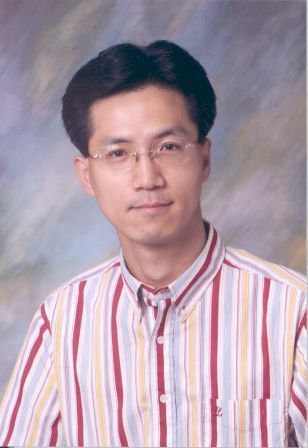
Inseok
Hwang
Professor
Research
Publications
Laboratory
Teaching
Background
Pictures
Links
Home
 |
School of
Aeronautics and Astronautics
Purdue University West Lafayette, IN 47907-2023 Contact
Office Phone: 765-494-0687 Office Fax: 765-494-0307 email: |
Dr. Hwang is a Professor
in the School
of Aeronautics and Astronautics at Purdue University. He
is a member of Purdue's Signature Area
for System-of-Systems
research. He earned his Ph.D. degree, specialized in the
area of multiple-vehicle control
and
its application to air traffic control using hybrid
systems approach, in the Department of Aeronautics and
Astronautics at Stanford University.
He
was a member of the Hybrid
Systems Laboratory at Stanford University.
He was a full time instructor in the
Department of Aerospace Engineering at Korea
Air Force Academy from 1994 to 1997. He is an
Associate Fellow of the American Institute of
Aeronautics and Astronautics (AIAA) and is a member of
the Institute of Electrical and Electronics (IEEE)
Control Systems Society and Aerospace & Electronic
Systems Society. He is currently an
associate editor of the IEEE Transactions on Aerospace and Electronic
Systems and Asian
Journal of Control, an editorial board member
of the International
Journal of Aeronautical and Space Sciences (IJASS)
and a conference editorial board member of IEEE Control Systems
Society.
Dr. Hwang's research has been strongly motivated by difficult and interesting practical problems such as controlling multiple-vehicle systems. Controlling multiple-vehicle systems is one of the most important and challenging aspects of modern system theory and practice. Control of such
systems involves the analysis of multiple dynamical systems which have inherently decentralized structures. The motions of vehicles have to be
coordinated in such a way that the vehicles achieve their goals without conflicts between them. This requires path planning (computing optimal
trajectories of vehicles from starting positions to destinations) and conflict detection and resolution. Path planning and conflict detection and
resolution require information about individual vehicles, and therefore communication between vehicles for sharing this information is important. Multiple-vehicle systems encompass a variety of applications, including groups of Unmanned Aerial Vehicles (UAVs), Satellites, and mobile robots; ad-hoc sensor networks; air traffic control.
Dr. Hwang's research has been strongly motivated by difficult and interesting practical problems such as controlling multiple-vehicle systems. Controlling multiple-vehicle systems is one of the most important and challenging aspects of modern system theory and practice. Control of such
systems involves the analysis of multiple dynamical systems which have inherently decentralized structures. The motions of vehicles have to be
coordinated in such a way that the vehicles achieve their goals without conflicts between them. This requires path planning (computing optimal
trajectories of vehicles from starting positions to destinations) and conflict detection and resolution. Path planning and conflict detection and
resolution require information about individual vehicles, and therefore communication between vehicles for sharing this information is important. Multiple-vehicle systems encompass a variety of applications, including groups of Unmanned Aerial Vehicles (UAVs), Satellites, and mobile robots; ad-hoc sensor networks; air traffic control.
Dr. Hwang is a head of the Flight Dynamics and Control/Hybrid Systems Laboratory.
AWARDS:
- NSF CAREER AWARD, 2008
- Selected into the nation's brightest young engineers by the National Academy of Engineering (NAE) who were invited to attend the 2008 Frontiers of Engineering Symposium, 2008.
- AIAA Special Service Citation, 2010
- AIAA
Associate Fellow, 2012